Ari White of Wandering Que describes his pandemic mentality as “radical flexibility.” He’s changed his operation from a full service food truck to local and long distance delivery. We talked with the 2016 Brisket King winner about how he has adapted in the last year and what his business will look like in the future. You can order delivery from Wandering Que throughout the east coast and midwest here. As told to Sarah Strong, this interview has been edited and condensed for clarity.
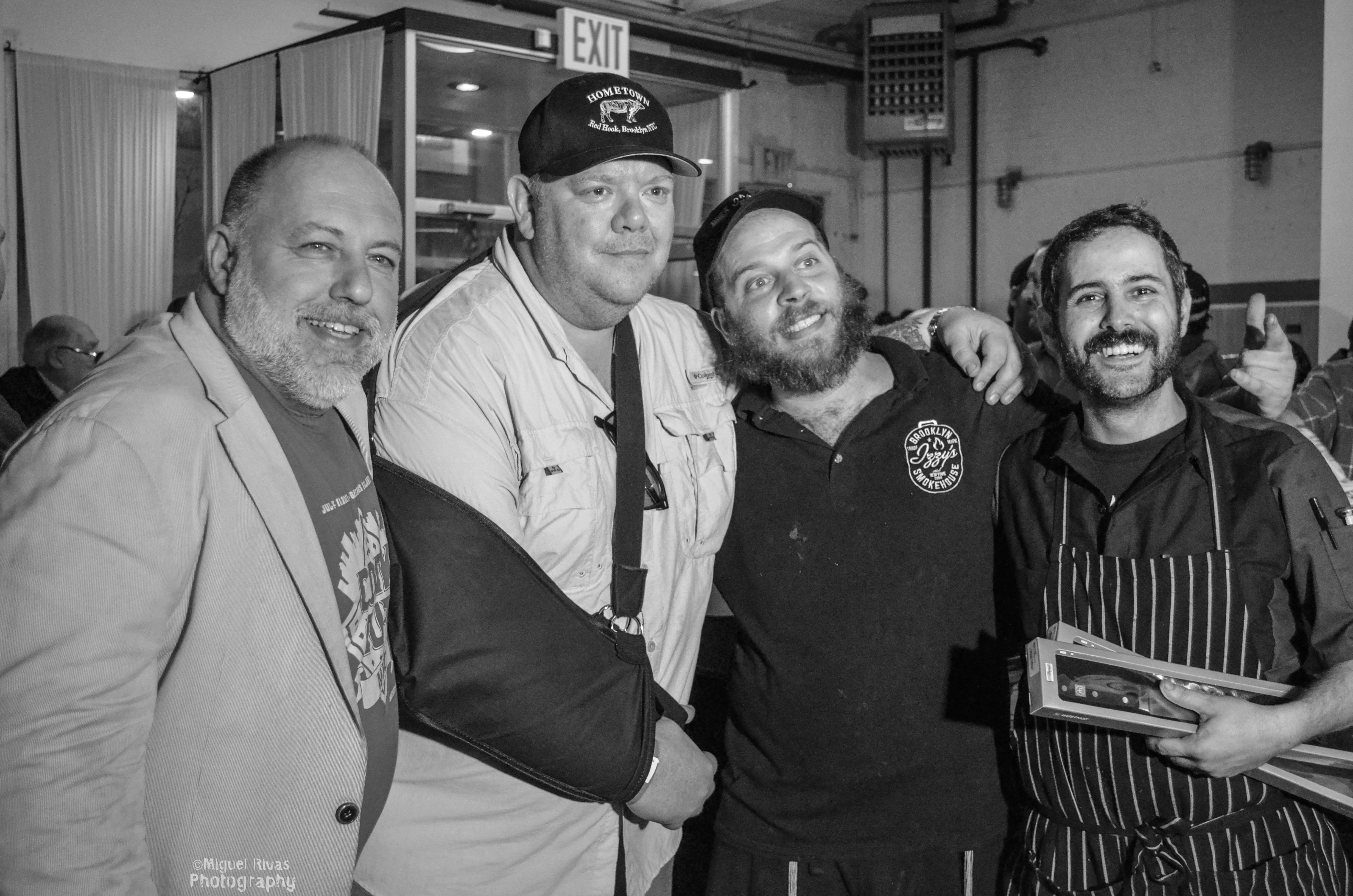
Food Karma: What has been your approach to the pandemic?
Ari White: We pivoted. My son’s school in New Rochelle was the first to close in the country, and it was my friends and neighbors who went into self-quarantine. When that happened we set up with free home delivery to anybody in quarantine. Over the next weeks and months, every event we had lined up evaporated. The USDA plant that was making all of my retail line went down, and things were pretty crazy.
We already had connections in communities across the east coast where the food truck used to go. The mission statement has always been “bringing kosher food to communities that don’t have it,” and, needless to say, almost nobody was doing anything wood smoked, so it had that novelty as well. We turned it into a communal pickup in those communities so people could order in advance. Instead of sending a ten man team and 11,000 pound trailer to go and smoke on site, we did the work here in the recently finished smokehouse in New Jersey and did delivery all over.
That’s organically grown and expanded. We’ve gone as far as Louisville, Kentucky. Last week was supposed to be Cleveland, Cincinnati, Columbus and Pittsburgh, but we had to push it off to next week because of the weather. I’ve got one route that goes up north hitting Stamford, Greenwich, New Haven, West Hartford, Providence, Sharon, Newton, Cambridge, Brookline and Brandeis. I’ve got one going that does the DC area including Kemp Mill, Baltimore, Silver Springs, Potomac, Virginia Beach, Arlington and Norfolk. That’s on top of local deliveries.
It’s all been really crazy. The biggest change is instead of doing 70 hour weeks, six days a week, we are pretty much Monday through Thursday these days and actually get family time and all sorts of human perks and necessities. I found out I have five kids! It’s been a pretty crazy ride.
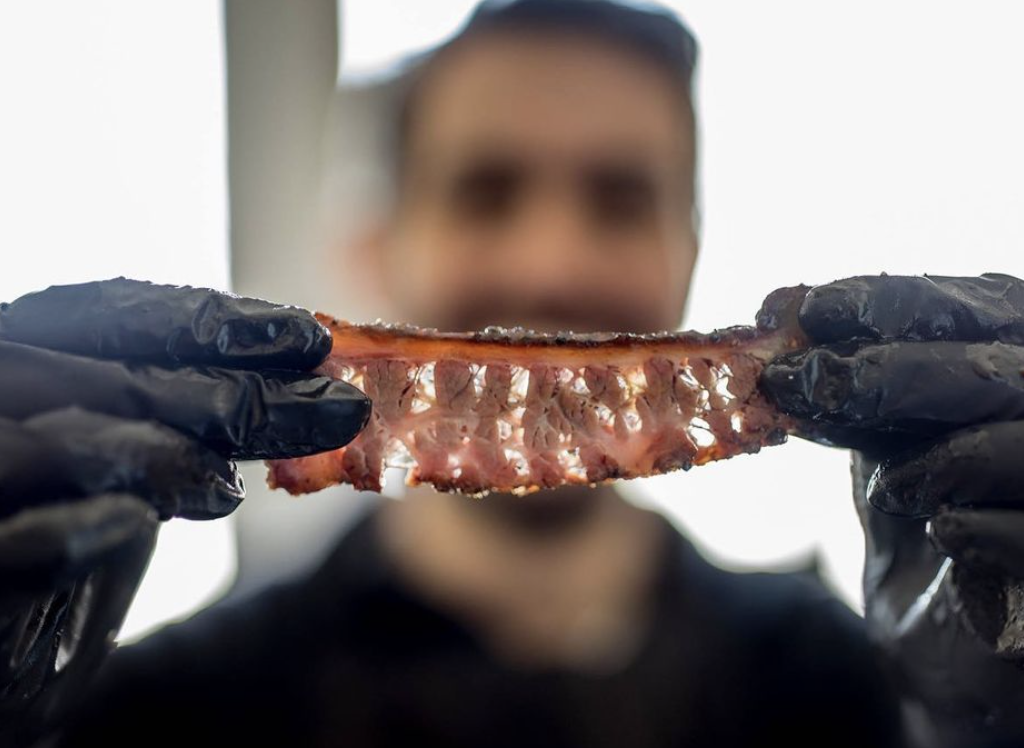
FK: Why did you decide to travel so far?
AW: We got invited. We had already done the Boston thing and other places in a two to three hour radius, but we got invited to Cleveland and thought it sounded awesome. If we’re going to go there, Pittsburgh is on the way. After doing the first one of those, somebody from Columbus asked if we would come as it’s only another hour, and we said yes. Then after while we were on that one, somebody said how about Cincinnati it’s only another hour. So we did that one, and then the guys from Louisville said, “Come on, it’s 45 more minutes,” and it has organically spread like that. Adapt or die.
FK: How did your subscription style boxes come to be?
AW: A lot of the places that we’re going, forget about not even having kosher restaurants, some don’t have butchers, some rely on supermarkets. There were requests for something that could be a little bit of everything, so the Carnivore Club was one, and then the Club Cue, which is more centered on raw product, was another one. It made really cool gifts. There’s about 50/50 between people buying for themselves or for someone else.
It’s been pretty amazing. We live in a world of Amazon Prime: people want stuff delivered to home. As crazy as this sounds, I can get a box anywhere in a five day radius for around $15 using UPS. I couldn’t cross the George Washington Bridge for that with a human driver, forget about gas or time or labor or anything else. This couldn’t work for everybody. A sushi guy couldn’t vacuum seal his products, but smoked meats are really built for this. The low and slow process of production lays the groundwork for a meat that is going to be juicy.
It’s almost more of a service to these far off communities, like a meat lovers survival kit. Having grown up in El Paso, Texas, a town without any kosher food, I totally get the struggle. My parents were one of a dozen families that would take turns bringing their suburbans to do 400 mile drives to Tucson or even further to Dallas and Houston to get kosher food and then come back with coolers. We all had a second freezer. It’s a different world. People can’t totally imagine not being able to walk into any store and buy anything or walk into any supermarket and grab what’s on sale.
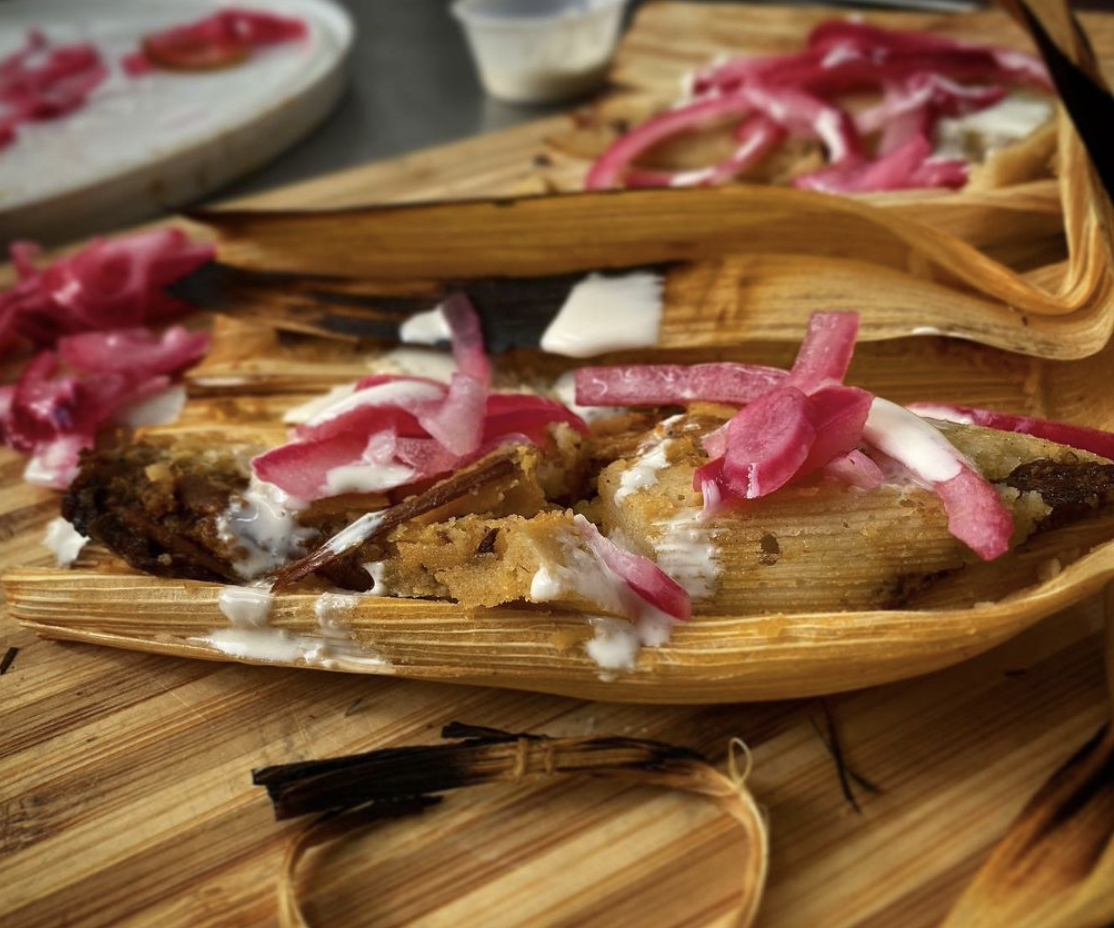
FK: Why did you start making dishes like tamales and sausage?
AW: It’s funny, I just wanted them for me. I woke up one morning with a hankering for tamales. I grew up on the border, that was normal food, and there’s no place up here that they exist kosher, even dreaming about it would be crazy. The funnier part was actually having to teach a couple of the hispanic guys in my kitchen how to make them because in their world only the women would cook them, whereas I grew up being taught.
If you look through the menu, the one thing holding everything there together is just that this is the food that I like to eat. I like the Chinese items, I’m in love with chili crisp. We made a mortadella because I’ve always wanted to try mortadella and it doesn’t exist kosher. I was fascinated by the story behind Linguica and the Portuguese sausages having been basically invented as a way for the Moranos, the hidden Jews, during the inquisition to be able to look like their neighbors. Cured meats was a standard mode of preservation once upon a time, but they’d mix in a little bit of bread so it would look a little bit lighter, more like pork, to fool their neighbors. 500 years later, these sausages are now national treasures.
Flipping through a translated Soviet handbook for Russian sausages, which I am a fan of because of how simple they are – these are five and six ingredient sausages without filler or chemicals or preservatives, out of the 1,300 recipes, there were three that were all beef. One of them was from Krakow, Poland which was a city famous for its bustling Jewish community, at least pre-WWII. That’s a sausage that I’m curious about myself. A lot of these are not by any means reinventing any wheels. These are foods that have been around for hundreds if not thousands of years. I just feel like they kind of got lost to us, and I guess it’s reintroducing the missing links.
FK: What do you want people to know about kosher barbecue and charcuterie?
AW: I always think back to Daniel Vaughn’s piece. He is probably the country’s foremost barbecue historian, and he did a piece a couple years back on the origins of barbecue brisket as we know it. The earliest written examples he could find were from two kosher joints in El Paso, Texas, my home town, dating back to 1911, which is two years before my family got there. These were cuts that were throwaways to the gentile world, whereas the kosher keeping crowd, which in the States doesn’t eat the hind quarter, really has to use up every bit. Brisket was just one of those meats that low and slow is the only way that it works. I’m happy to point to that one showing that Jews in Texas particularly were really at the start of this barbecue brisket world. It just maybe took 100 years for it to come full circle again. I’m happy to be just one of many up here in New York still slinging it.
El Paso was a vital city for the kosher beef industry. From where beef was slaughtered till getting to the East Coast where it was processed, part of the kosher rules had it being washed down every three days before it was cut and salted. El Paso was just one of those stopping grounds on the way there even though all of that meat was destined for the East Coast.
The kosher butcher in El Paso shut down in the late ‘80s. I named my first slicer at my first restaurant after the owner’s wife. Her name was Doris. I vividly remember she was missing her thumb. She had chopped it off when somebody had called her name, and the knife went down, and she took her thumb off and she replaced it with her big toe. As a six year old, I always remember being fascinated by this woman’s hand because on one side was a thumb and on the other side was a toe. When I got that first slicer, we named it Doris such that no other fingers should be lost in the preparation of food.
El Paso was an interesting place, also a city with a very large Morano community. I’ve seen numbers as high as sixty and seventy percent that actually have Jewish blood in them. The inquisition chased everybody over here, and they just kept fleeing further north.
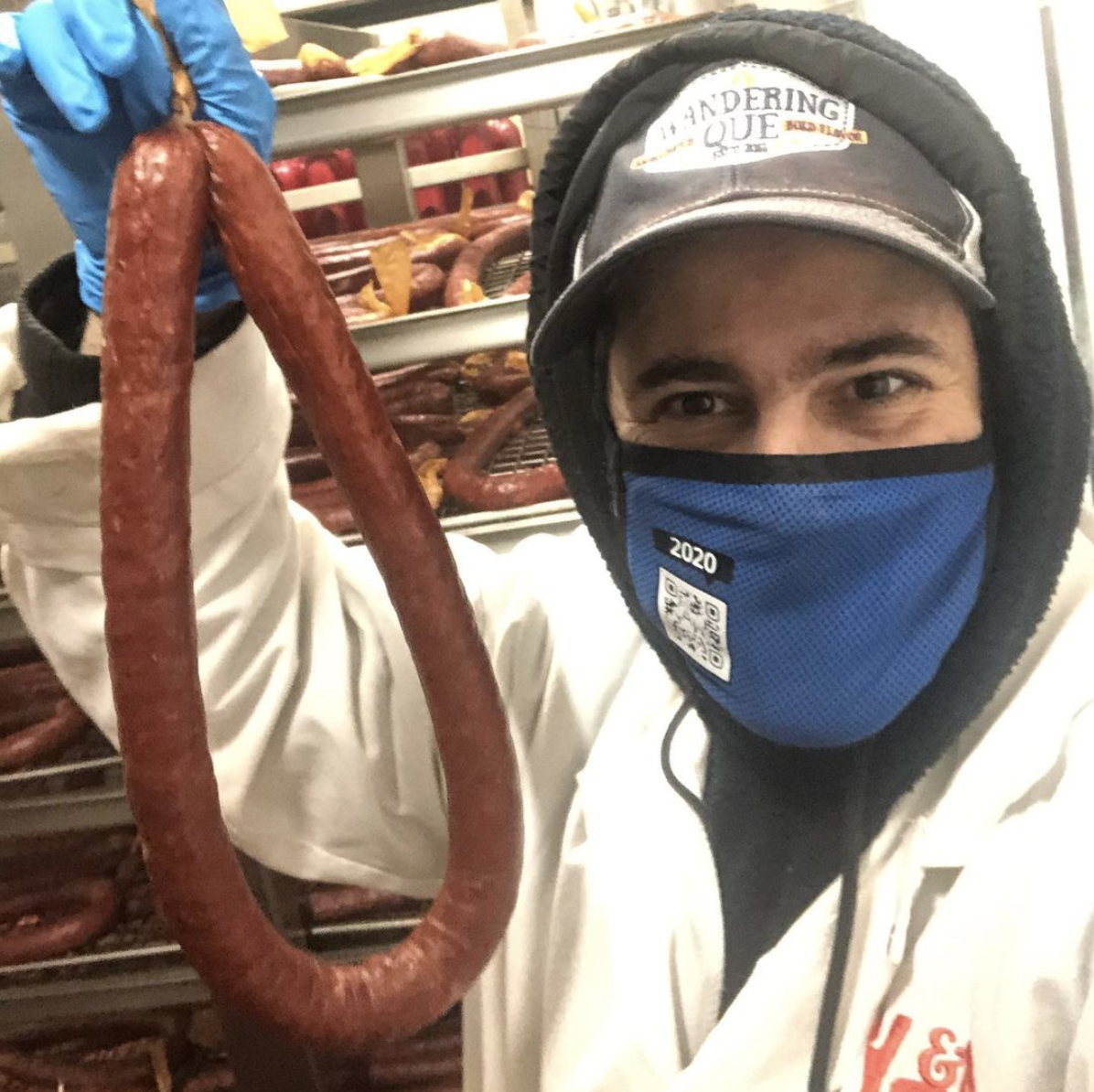
FK: What have you learned about your business during this time?
AW: That is a good question. Inherently I knew this before, but really realized how important it was as we started going further and further off to these communities. Food can really be a beacon of light in crazy dark times. I miss the raised eyebrows of people standing in line. I miss the excitement of people even after they’ve been standing in line for 45 minutes because it was such a treat.
I think one of the biggest challenges that restaurants have right now is that so much of the magic of what we do is ambiance. That food can be delicious, but put that into a pint container and have it delivered cold in a brown bag and it’s really hard to keep that magic. We get emails or Facebook or Instagram pictures of just how excited people are. You can really make somebody’s day or week. To get letters from six year olds with crayon drawings, I never, ever, ever imagined any of that, so to still be able to kind of offer that magic but on a delivery side has been the biggest surprise out of all of this and really what has kept us going.
FK: Do you think you’ll keep doing the long distance deliveries?
AW: Yeah, first off, I don’t think this pandemic is going anywhere any time soon. I think the game has changed. I see us only expanding this model further even if I do get to open back up and put my food truck back on the road. I’d love nothing more than to have my guys out on Sundays again at street festivals and carnivals, but I think at this point those would only be supplementing the rest of what we’re doing and not the other way around. It used to be that on a given day my team would work 21 hour days to feed a community. We’d have to go over there and set up shop and light the fires and it’s three hours before things are hot and ready to go. After it’s all done, it’s another two hours to break it down and travel back and unload. Now, instead of ten guys doing all that work, I can have a single driver go and do deliveries, not for one community but for a half a dozen across three states. We are also drop shipping all over the place now. The menu had to change a little bit for that to happen, there were items that didn’t make sense on it, but that’s okay too.
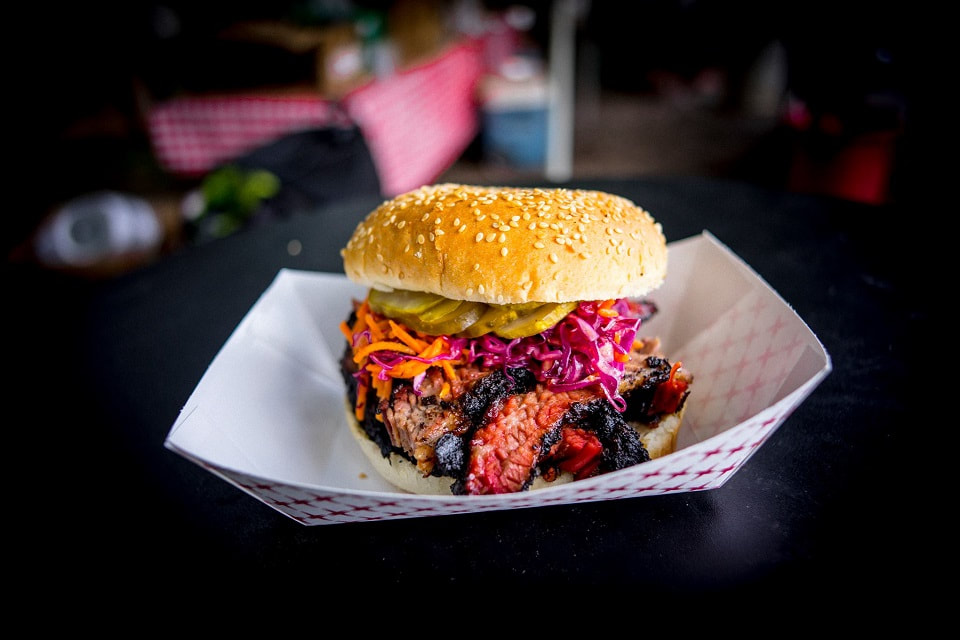
FK: Do you still get customer connections?
AW: It’s definitely very different. I feel like social media is all the more important now. I never got cartoon drawings mailed to me before and I’ve been doing this for years. I totally imagine some parents with kids running around the house doing anything to get the kids to sit still for three seconds, I’m totally projecting as a father of five. I think we’re having a far bigger impact on people’s lives now than we ever did before when we were just sort of the circus coming to town. It’s been a crazy trip.
FK: What are you looking forward to?
AW: I’d like to feel my toes again! I put a post out this morning to all my friends back in Texas with a couple life hacks on how to keep warm when there’s no heat.
One really ironic thing about all of this is that the buildout of this factory here in Hackensack was supposed to be four months and instead dragged on for like two years. We only opened in full swing about six weeks before the pandemic hit. It’s maddening, but at the same time we were accidentally built for this. This place is the ultimate ghost kitchen: there’s no traffic, we have no retail space, there’s no place for people to come and eat and hang out, but what it ended up meaning was my staff is a small pod here. We have absolutely zero interaction with the outside world. On the one hand, that sucks, but on a different side, it’s really let us survive this. My delivery drivers are different from the kitchen staff. The people that are out there interacting are not the ones here producing.
All of these things that used to be negatives about this place are now totally what I think are going to let us survive this thing, hell even thrive during it. Two more months and our line is back out on shelves, which is incredible.
FK: What’s in your line?
AW: We’re going to start off with Texas hot links, Hatch green chile chicken sausages, German bierwurst and pepperoni. Stage two will be pulled brisket and a lamb bacon and then we’ll take it from there.
What’s incredible is this last year we’ve really been laying the groundwork in these communities across the east coast. I think that’s better than any marketing or magazines or websites ever could do because they already know our food. Instead of just getting the chance to order it once a month when we’re passing through town, it will be in their local supermarkets. It’s been a guerrilla marketing bonanza on that end.
FK: Where will we be able to find your products?
AW: Before all this went down, we were at ShopRite, Key Foods and had just tapped into major changes. We had just started in Florida and on the west coast. It was a bummer to lose all of that momentum, but a year down the line, it’s nice to not have to reinvent the wheel for it. These things take time, and the hustle continues.
